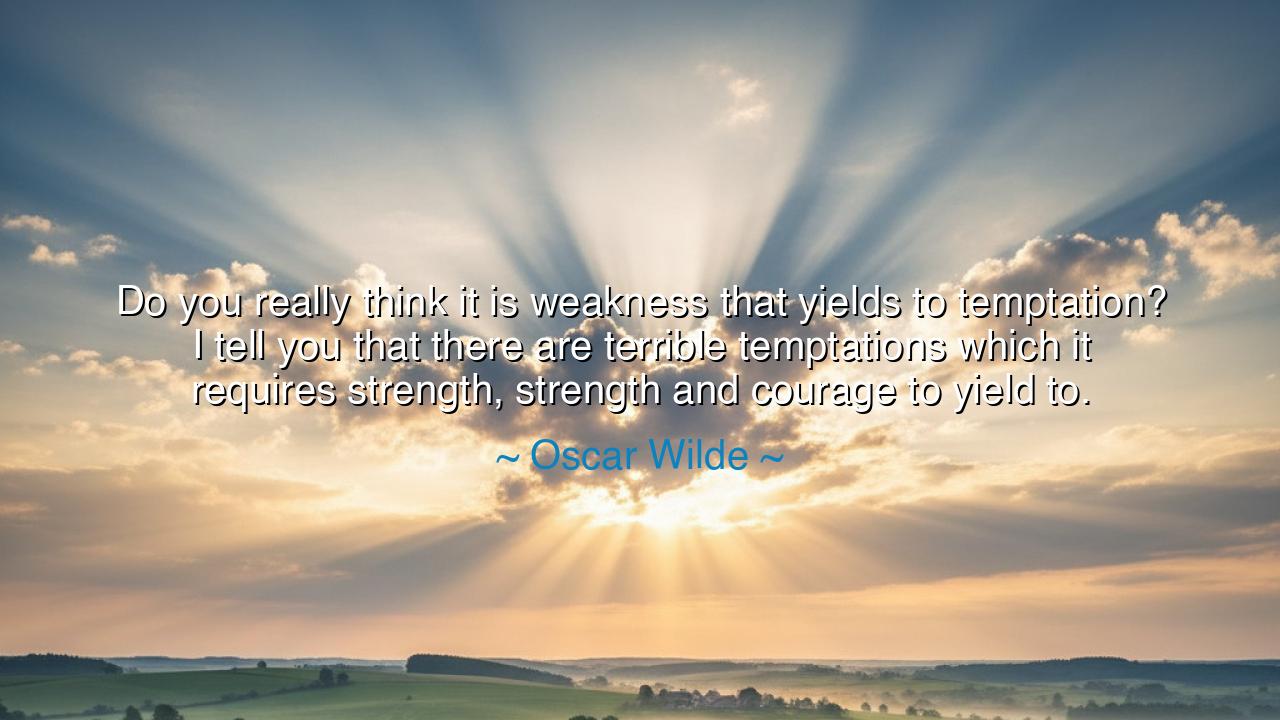
Do you really think it is weakness that yields to temptation? I
Do you really think it is weakness that yields to temptation? I tell you that there are terrible temptations which it requires strength, strength and courage to yield to.






"Do you really think it is weakness that yields to temptation? I tell you that there are terrible temptations which it requires strength, strength and courage to yield to." — Oscar Wilde
So spoke Oscar Wilde, the poet of paradox, the philosopher of pleasure, and the tragedian of beauty. His words, like a blade dipped in honey, cut through moral simplicity and expose the hidden depths of the human soul. To the casual ear, this saying may sound like rebellion against virtue — a defense of indulgence. But in truth, it is an examination of the complex nature of temptation, of the human will, and of the strange strength that lies even in surrender. For Wilde understood, as few men have, that moral struggle is not a battlefield of black and white, but a labyrinth of light and shadow, where even yielding may come from a place of passion, conviction, or defiance — not mere weakness.
When he asks, “Do you really think it is weakness that yields to temptation?” Wilde challenges the common belief that virtue belongs only to restraint. He suggests that to yield can sometimes demand as much courage as to resist — for there are temptations so fierce, so consuming, that to face them at all requires tremendous strength of spirit. It is easy to refuse what one does not desire, but to stand before the fire of one’s longing and to step into it — to accept its consequences knowingly — that is a kind of strength few possess. In such moments, the heart does not surrender out of cowardice, but out of a will to live truthfully, to experience deeply, even if it leads to ruin.
In Wilde’s own life, this idea was no abstraction. He lived it. The world around him prized convention, yet he followed his own desires, his own vision of beauty and truth, even when it cost him everything — reputation, freedom, and peace. When the shadow of scandal fell upon him, he might have fled; he might have conformed; he might have hidden his soul behind the polite masks of his age. Instead, he yielded to the temptation to live as himself, fully and fearlessly. It was a choice not of weakness, but of defiant strength, born from the courage to embrace the self that society condemned. His downfall, though tragic, was also a triumph of authenticity — a living embodiment of the struggle between the flesh and the spirit, between desire and duty.
This truth is not unique to Wilde. Throughout history, there have been men and women who have yielded to forbidden callings, not from frailty, but from conviction. Think of Galileo, who refused to deny the motion of the Earth, even though the Church threatened him with death. His “temptation” was not of pleasure, but of truth — a dangerous desire to see beyond the accepted order. He yielded to it, and in doing so, defied the powers of his age. Or Eve, in the ancient story, who plucked the fruit not out of ignorance, but out of a thirst for knowledge. Her act, condemned as sin, was also the first rebellion — the moment humanity awoke to awareness and freedom. Wilde, in his way, speaks for them all: those who dare to follow the forbidden path not out of weakness, but out of the strength to seek experience beyond safety.
And yet, let us not mistake Wilde’s paradox for a dismissal of virtue. His words do not glorify reckless indulgence, but remind us that morality is not as simple as it seems. There are times when the soul must yield not to base desire, but to higher truths that the world calls taboo — times when following one’s passion requires a courage greater than obedience. There are also temptations of the heart — to forgive when wronged, to love when wounded, to trust when betrayed — that demand the same strength. These too are forms of yielding that require courage, for they expose the self to pain in the name of something larger: love, truth, or creation.
Wilde’s paradox, then, becomes a mirror of life itself. Every man and woman must one day face the moment when temptation calls — whether it be for love, for truth, for beauty, or for freedom. And in that moment, the question is not merely “Will I resist?” but “What is it I am resisting — and why?” For there are temptations that destroy the soul, yes, but there are also those that awaken it. To yield blindly is weakness; to yield knowingly, out of the courage to live authentically, is a kind of tragic strength.
So, my listener, take this lesson to heart: do not rush to condemn those who yield, nor pride yourself in those who always resist. Look instead at the heart — for there lies the measure of true strength. When life tempts you — whether with love, with truth, or with risk — listen to the still voice within. If it speaks of fear, hold your ground; but if it speaks of truth, even painful truth, then perhaps the greater courage lies in surrender. For the soul grows not by avoidance, but by experience — not by hiding from the fire, but by walking through it.
Thus, as Oscar Wilde teaches, even in yielding there may be greatness — for to live deeply, to feel fiercely, and to dare greatly is the destiny of the human heart. Whether it leads to triumph or to ruin, the courage to follow one’s truth is the essence of freedom, and in that freedom, the soul finds its most profound and terrible joy.






AAdministratorAdministrator
Welcome, honored guests. Please leave a comment, we will respond soon